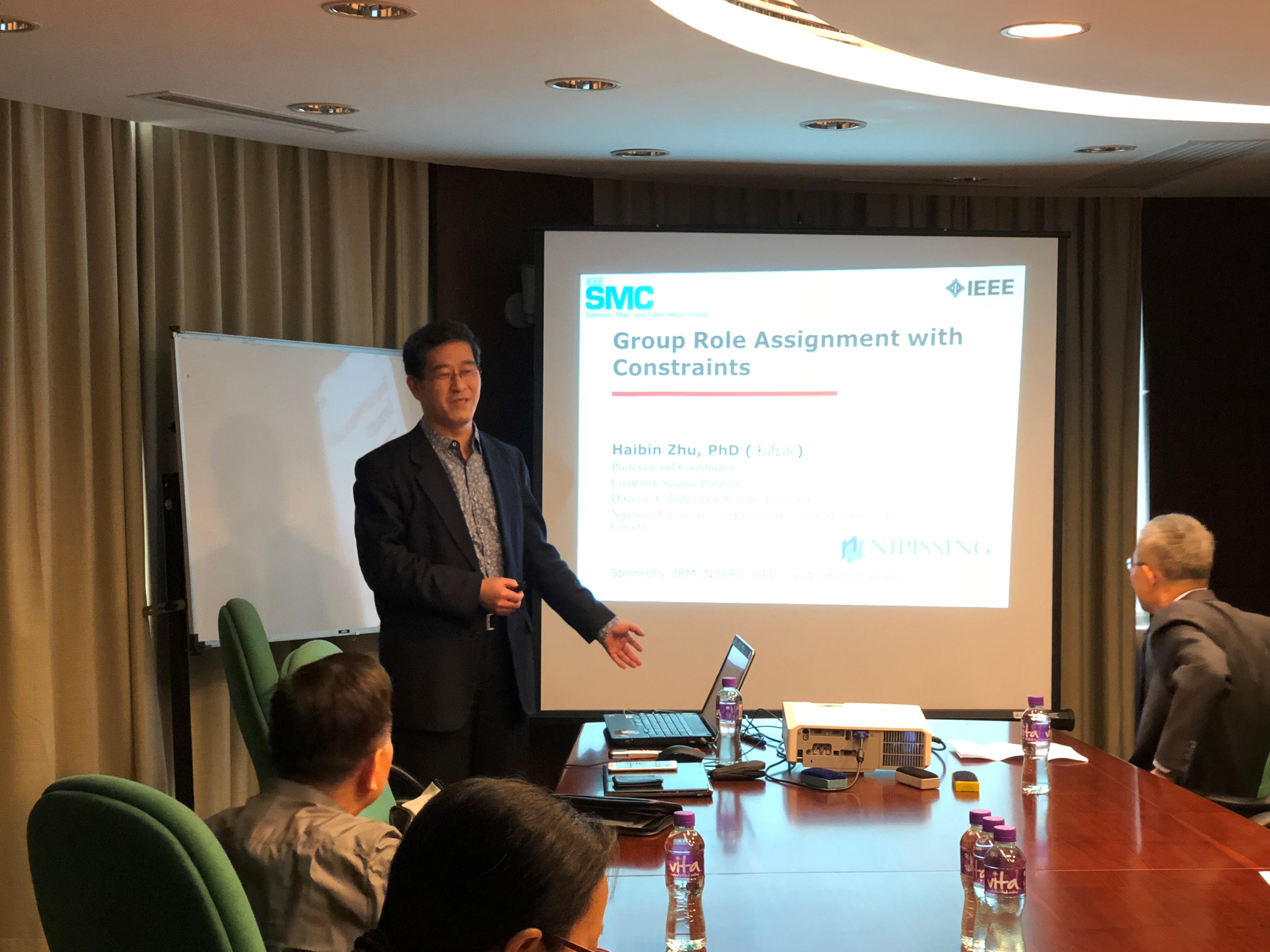資訊科技學院於2018年3月27日在A座201室舉辦學術研討會,幷邀請了加拿大Nipissing大學的朱海濱教授擔任本次研討會的演講嘉賓。他以《Group Role Assignment with Constraints》為題進行了演講。資訊科技學院院長張渡教授、助理院長李建慶教授以及師生共20餘人出席了研討會。
Role-Based Collaboration (RBC) has been proposed as an emerging and promising approach to facilitating collaboration. It utilizes roles as underlying mechanisms to support collaboration by taking advantages of roles. It is divided into several phases: role negotiation, role assignment, and role play. Role assignment can be categorized into three phases: agent evaluation, group role assignment, and role transfer. Agent evaluation rates the qualification of an agent for a role. It requires a check on the capabilities, experiences, and credits of agents based on role specifications. Qualifications are the basic requirements for possible role-related activities. It is a fundamental yet difficult problem that requires advanced methodologies, such as information classification, data mining, pattern search, and match. Group role assignment (GRA) initiates a group by assigning roles to its members or agents to achieve its highest performance. Administrators must conduct it by thinking of the issues brought in by the assignment. In dealing with GRA, there are many constraints we need to consider. These constraints come from the future role execution, including conflicts, cooperation, limitations, and feasibility. This talk introduces the concepts of Role-Based Collaboration and the E-CARGO (Environment – Classes, Agents, Roles, Groups, and Objects) model, clarifies the group role assignment problems by examples and formalizations, discusses the solutions, and presents the recent research results.
個人簡介:
Dr. Haibin Zhu is a Full Professor and the coordinator of the Computer Science Program, Founding Director of Collaborative Systems Laboratory, member of Arts and Science Executive Committee, Nipissing University, Canada. He received B.S. degree in computer engineering from Institute of Engineering and Technology, China (1983), and M.S. (1988) and Ph.D. (1997) degrees in computer science from the National University of Defense Technology (NUDT), China. He was a visiting professor and a special lecturer in the College of Computing Sciences, New Jersey Institute of Technology, USA (1999-2002) and a lecturer, an associate professor and a full professor at NUDT (1988-2000). He has published 160+ research papers, five books and four book chapters. He is a senior member of IEEE and is serving and served as co-chair of the technical committee of Distributed Intelligent Systems of IEEE SMC Society, Associate Editor (AE) of IEEE Transactions on Systems, Man and Cybernetics (SMC): Systems, and IEEE SMC Magazine, and IEEE Canada Review, guest (co-) editor for 3 special issues of prestigious journals, and organization chairs for many IEEE conferences. He has been an active organizer for the annual IEEE Int’l Conf. on SMC since 2003, as Area Co-Chair, Social Media Co-Chair, Web Co-Chair, Poster Co-Chair, Session Chair, and Special Session Organizer. He is the Program Committee (PC) Chair for 16th IEEE Int’l Conf. on Networking, Sensing and Control, Banff, AB, Canada, May 8-11, 2019. He was a PC Chair for 17th IEEE Int’l Conf. on Computer Supported Cooperative Work in Design, Whistler, BC, Canada, June 27- 29, 2013. He also served as PC members for 60+ academic conferences. He is a founding researcher of Role-Based Collaboration and Adaptive Collaboration.
He is the receipt of the chancellor’s award for excellence in research (2011) and two research achievement awards from Nipissing University (2006-2007, 2012-2013), the IBM Eclipse Innovation Grant Awards(2004, 2005), the Best Paper Award from the 11th ISPE Int’l Conf. on Concurrent Engineering (ISPE/CE2004), the Educator’s Fellowship of OOPSLA’03, a 2nd class National Award for Education Achievement(1997), and three 1st Class Ministerial Research Achievement Awards from China (1997, 1994, and 1991).
His research interests include Collaboration Theory, Technologies, Systems, and Applications (Role-Based Collaboration and Adaptive Collaboration), Human-Machine Systems, CSCW (Computer-Supported Cooperative Work), Multi-Agent Systems, Software Engineering, and Distributed Intelligent Systems.

